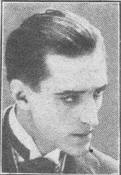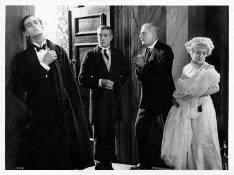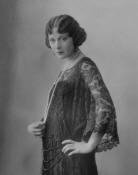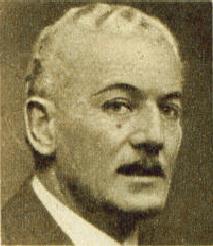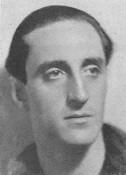The Fruitful Vine
|
|
"The Fruitful Vine" A young wife's drastic step to gratify her elderly husband's desire for a child—Magnificent acting in emotional drama with curious theme—Brilliant staging and superb photography. Their childlessness is the only blot upon the married happiness of Sir Theodore Cannynge, an elderly Englishman living in Rome, and his young wife, Dolores. When their old friend, Denzil, dies suddenly, Theodore devotes much of his time to Denzil's wife and children. Feeling herself neglected, Dolores accepts the attentions of Don Cesare Carelli, a Roman libertine, to whose passion she ultimately surrenders. In due course Dolores discovers that she is enceinte, and although her husband is overjoyed, she is filled with terror. When the child is born Don Cesare proclaims himself its father to the horrified Theodore. As the two men face each other, the nurse enters to say that Dolores is dead. Crushed, Don Cesare departs, whilst Theodore, learning that Dolores had longed to gratify his desire for a child, humbly acknowledges her greatness of character. A magnificent example of British acting and British studio-craft is this beautifully mounted version of Robert Hichens' novel, produced by Maurice Elvey from a scenario by Leslie H. Gordon. Each scene shines upon the screen a glittering vision of a brilliant dream world wherein the spectator lives for two hours amid stately marble halls and sunlitten gardens. The settings of the film definitely place the Stoll Company on a level with any other producing house in the world so far as technical resources are concerned. Of absolutely first-rate quality also is the acting, marked by the restraint and dignity for which British artists are famous. We must confess that we do not consider Mr. Hichens' novel, or the scenario made therefrom, entirely worthy of the artistic and technical resources which have been brought to its interpretation. It is a story with many deeply human qualities—and these have been fully brought out by the acting—but its argument is unconvincing in logic and of doubtful morality. Moreover, its dramatic possibilities have not been developed to the utmost, with the result that the theme seems even less plausible than it might have been. In a few words, the story tells how the young wife of an elderly man surrenders to the passion of a libertine in order to gratify her husband's unfulfilled longing for a child. Learning the truth on his wife's death, the husband acknowledges: "I didn't understand. She was better than ..." "Pretty nearly all the big things women do are for men who don't understand," declares a concluding title which seeks to glorify the wife's lapse from virtue as an act of supreme heroism. As a matter of fact, it is by no means clear from the action that, in submitting to her seducer, Dolores is actuated by any motive whatever save the ennui of a young wife who fancies herself neglected. As a justification of adultery, the excuses made for Dolores are, indeed, mere sophistry, and we think the Stoll Company would be well advised to eliminate this very dubious "moral" of the story altogether, presenting it as a plain tale of human passion. A few simple alterations in the titling would effect the necessary change, and would improve both the probability and the dramatic appeal of the plot. Owing partly to the twisted logic of the theme and partly to a rather hasty and inadequate treatment of the climax (showing the meeting of husband and lover by the wife's death-bed), the earlier episodes of the drama are, perhaps, the most effective. Most striking of all is a wonderfully emotional scene in which an affectionate father (doomed to die under the surgeon's hand next day) attends a happy children's party at which his own little son recites Tennyson's "Crossing the Bar," unaware of its dreadful significance in the circumstances. Undoubtedly one of the most touching and human moments ever created on the screen, this infinitely pathetic incident will be remembered when the tragedy of Dolores is forgotten because it is based upon truthful sentiment. Two outstanding performances are given by Mdlle. Valia as Dolores and Robert English as Sir Theodore. Mdlle. Valia has a personality as fresh as it is striking. Mistress to a rare degree of gesture and facial expression, she should have a great future on the screen in roles suited to her intensely individual methods and lively temperament. Mr. English's study of a British aristocrat of the best type is a delight to witness, and, incidentally, is "propaganda" of the most desirable nature. Excellent work is done, also by Teddy Arundell (very serious for once) as the doomed husband, Mary Dibley as his gentle wife, and Fred Raynham as a surgeon whose sense of pity has not been destroyed by his professional experience. Basil Rathbone has a difficult and unpleasant role as the Italian libertine, and the fact that both author and title writer do everything possible to represent him in the worst light does not help him to create sympathy with a despicable character. Under the circumstances, he give a remarkably clever performance. As a whole, "The Fruitful Vine" is without question a great credit to the Stoll Company. Although one could have wished for a better story, the production—meaning acting, staging and photography—is well-nigh above criticism. A few cuts in the too numerous scenes with the children would speed up the action, and the elimination of the "moral" on the lines we have suggested seems obviously desirable. With these improvements, the picture should prove a really big attraction at almost any theatre. It is certainly a splendid advertisement for British film-making. —The Bioscope, October 6, 1921 |
"The Fruitful Vine is a tragic story of a wife's sin, which was really self-sacrifice—a picture that delights the eye and tears at the heart. It is a picture with a wonderful climax. ... The whole act moves in one vast crescendo to the vital and compelling moment in the last five minutes of the final reel. Moreover the picture is a magnificent example of all British acting and studio-craft—a British film of such outstanding merit that the British public will be proud of it." —The Mansfield Reporter and Sutton Times, April 14, 1922
"The Fruitful Vine is a story of a woman's supreme love and high devotion, and how much these things availed. It is an absorbing presentation, quite unique in many ways." —Midland Daily Telegraph, March 21, 1922
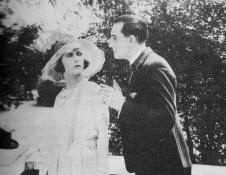 Valia Venitskaya and Basil Rathbone |
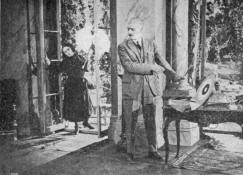 Valia Venitskaya and Robert English |
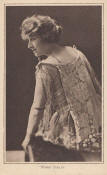 Mary Dibley ("Edna Denzil") |
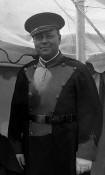 Teddy Arundell ("Francis Denzil") |
"It is a picture which delights the eye and tears at the heart. While dealing with a delicate problem, the subject has been treated so beautifully and so artistically that there is absolutely nothing at which the most fastidious may take exception." —The Derby Daily Telegraph, December 9, 1922
"Most critics praised the picture's production values, but felt the story left much to be desired. ... Rathbone's performance in this silent production did not impress the critics." —Michael Druxman, Basil Rathbone: His Life and His Films
| The Fruitful Vine "The Fruitful Vine" is indisputably a super film. It is remarkable not only for the unusual nature and dramatic power of its story, but also for the lavish style in which it had been produced. The tragic tale is unfolded against a background of gorgeous interiors and exteriors of exquisite beauty. As his theme, Robert Hichens has taken one of the biggest problems of everyday life—the childless marriage—and he has given us, with poignant power one woman's attempted solution of the problem. Dolores' bid for happiness, rightly understood, is a heroic one; and though it results only in greater tragedy, it brings to her husband a realisation of her love and anguished self-sacrifice which otherwise would have remained hidden from him by his own discontent. Crudely written, "The Fruitful Vine" would have been an ugly book; but Robert Hichens' genius and wonderful delicacy of touch have made of it a masterpiece. Crudely filmed, "The Fruitful Vine" would have been an ugly picture—indeed it might have been a revolting picture, but Maurice Elvey, who produced it for Stolls, is an artist in pictures just as Robert Hichens is an artist in words, and the result is a triumph in screencraft. The tragic part of the childless wife is played with consummate artistry by the young Russian actress, Valia, who found fame in this role, while that of Edna Denzil, the wife who is blessed with children but who is deprived of her husband is excellently filled by Mary Dibley. Robert English figures effectively as Dolores' husband and Teddy Arundell as the husband of Edna Denzil—a very lovable character. Basil Rathbone as Don Cesare, the Italian lover of Dolores, gives a fine study in Southern temperament, and lesser roles are cleverly filled by Fred Raynham, Irene Rooke and Paulette del Baye. "The Fruitful Vine" is a picture that would pack houses under the very worst of conditions. —Montrose Standard, February 2, 1923 |
"The last scenes of the film are tremendously dramatic, but all through the interest is sustained. The settings are particularly fine and the acting and photography all that can be desired." —The Gloucester Citizen, December 5, 1922
"Gorgeously produced with an all-round beauty and technique never before seen in a British film, Stoll's latest shown picture, 'The Fruitful Vine,' is disappointing. Nothing has been left undone to make success certain, nothing but the all-important choice of a story. Robert Hichens' story is mournful to a degree." —Variety, October 14, 1921
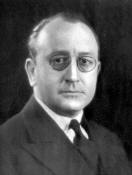 Maurice Elvey, Director |
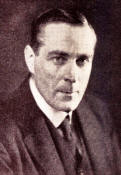 Fred Raynham ("Dr. Ides") |
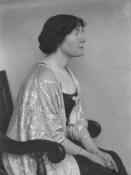 Irene Rooke ("Lady Sarah") National Portrait Gallery, London |
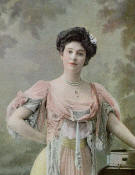 Paulette del Baye ("Princess Mancelli") |
The Fruitful Vine was released in September 1921 in the U.K. The film is not currently available on DVD, Blu-Ray or videotape, but it appears that the British Film Institute has a copy of the film. We can hope that someday we will be able to view it.
.
|
.







